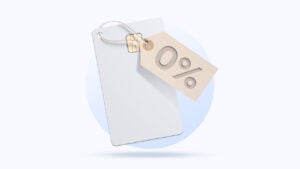Carrying a balance on a credit card for the first time




Key takeaways
- Carrying a balance on your credit card past your grace period means that you’ll start accruing interest on that balance, which will continue to grow until you pay it off completely.
- If this is the first time you’ve carried a balance on your credit card, don’t worry — as long as you have a plan to pay it down and make on-time payments every month, you shouldn’t have cause to be concerned.
- Because you’re carrying a balance, you might also see changes in your credit score because of your current credit utilization ratio.
For some people, carrying a credit card balance isn’t always a choice — it’s the only way to handle a financial emergency or cover expenses during a period of unemployment. Other people choose to carry the occasional balance to fund a large purchase, take advantage of a 0 percent intro APR offer or temporarily cover an expense that they plan to pay off later.
If this is the first time you’ve ever carried a balance on a credit card, you might be feeling embarrassed or anxious — but it isn’t the end of the world. It’s also not as uncommon as you might think: Forty-eight percent of cardholders in the U.S. carry debt from month to month, according to Bankrate’s 2025 Credit Card Debt Survey.
As long as you can avoid falling into unmanageable credit card debt, you’re doing fine. And if you do find yourself with a higher balance than you can handle, there are strategies to help you pay off credit card debt.
Let’s take a look at what happens when you carry a balance on your credit card and how to pay it off as quickly as possible.
What does it mean to carry a balance on your credit card?
When you carry a balance, you are essentially borrowing money from your credit card issuer. You need to make at least the minimum payment on your balance every month to remain in good standing with your creditors. You’ll also need to pay back your balance in full at some point, otherwise, you risk turning it into long-term credit card debt.
Statement balance vs. current balance
It’s also important to note the difference between your card’s statement balance and its current balance, especially since the two terms often get confused for one another.
At the end of your billing cycle, you’ll get a credit card statement, either online or in the mail. This statement will tell you how much you owe for that billing cycle — but the payment won’t be due for another few weeks.
That’s because, in most cases, your credit card issuer offers a grace period during which you can pay off your balance before it accrues interest. This grace period is generally the same length as your credit card billing cycle. But during that grace period, you might still charge purchases to your credit card, meaning your current balance will look different than your statement balance.
If you’ve paid off your most recent statement balance in full but still have a balance on your credit card from purchases related to the next billing cycle, you’re not actually carrying a balance on your credit card, and you’re not yet accruing interest on your most recent charges.
In short: You’re only technically carrying a balance if you don’t pay off your statement balance in full and let the rest of it roll over past your grace period.
What happens when you carry a balance on your credit card?
If you do carry a balance past your credit card, you’ll likely run into the following situations:
Your balance will start accruing interest
If you don’t pay off your balance in full before your grace period expires, your credit card issuer will begin to charge interest not only on your current balance, but also on any new purchases you make on the card. This interest will rack up faster than you might think, so make sure you keep an eye on your balance.
You’ll lose your grace periods
If your grace period expires, and you still have a balance, you won’t get another interest-free grace period until you pay the balance down. This means that new purchases will accrue interest right away.
However, you can start to earn back your grace period by paying off your balance in full.
Your credit score might drop
When your credit card issuer reports this information to the credit bureaus, they’ll see that your credit utilization — or the amount of credit you’re using compared to your overall available credit limit — has changed. This can cause your credit score to dip. That’s because 30 percent of your FICO credit score is based on the amount of money you owe your creditors, so even carrying a small balance on a credit card could temporarily lower your credit score.
If you didn’t pay your last credit card bill at all, not even the minimum payment, your score could also dip because that will negatively impact your payment history. If you notice your credit score has gone down a few points after carrying a balance on a credit card, don’t worry — once you pay it off, your credit score should go up again.
Keep in mind: If you’ve missed a few payments, it’ll likely take longer for your score to recover. So, try to stay on top of your payments even if it means just paying the minimum due.
How much interest will you pay on your credit card balance?
If you are carrying a balance for the first time, you probably want to know how much it’s going to cost you in interest charges. It all depends on the interest rate your credit card issuer offers you and how that interest is calculated.
When you carry a balance beyond your credit card grace period, your credit card issuer begins to charge interest according to the terms in your credit card agreement. If your credit card offers a 0 percent introductory annual percentage rate (APR) on purchases for the first year, for example, you get 12 months of 0 interest on any balances associated with new purchases.
If you are not under a 0 percent intro APR offer, then it’s likely that your credit card interest will be calculated to compound daily.
Let’s say that your credit card issuer is charging you the average credit card interest rate — at the time of writing, it’s 20.09 percent. Your daily interest rate can be calculated by dividing your APR by 365. With a 20.09 percent APR, that comes out to roughly 0.055 percent interest per day.
So, if you carry a $1,000 balance on your credit card, you’ll be charged 0.055 percent interest the first day your balance passes your credit card grace period, which comes out to about 55 cents. The next day, you’ll be charged interest on $1,000.55, instead of just $1,000, and that pattern will continue until you pay off your balance.
Don’t expect to watch your balance increase by a few pennies every day, though. Even though credit card interest is calculated daily, you’ll only see the final tally when you receive your credit card statement. That’s why some people are surprised to see just how much interest can accrue over a single billing cycle and why it’s important to pay off your balances as quickly as possible.
Common reasons to carry a balance on a credit card
Carrying a balance on a credit card is never ideal, but it can help you in a financial pinch. You might find that you have to carry a credit card balance when you:
- Need to cover medical bills: You might have to pay off an emergency medical bill and decide your best course of action is putting it on your credit card.
- Are dealing with home or auto repairs: These unexpected expenses can get costly quickly, so putting them on a credit card can help you deal with the damage up front.
- Want to pay off a large purchase: It’s not uncommon to cover a large purchase with a credit card and pay it off over time.
- Complete a balance transfer: Some cards are designed to help you pay down debt by allowing you to transfer that debt from a high-interest card to a new one. If you have a balance transfer card and want to pay down your debt, you’ll have to carry a balance to do so.
If you know you’ll have to carry a balance on your credit card soon, you might be able to plan ahead and sign up for a new card. If you choose one with an introductory APR offer, you might not even have to pay interest on your balance.
Many credit cards come with 0 percent introductory APR offers on new purchases, and the best 0 percent intro APR credit cards give you a year or more to pay off your purchases before the regular interest rates kick in. If you pay off your balance in full before the 0 percent intro APR expires, you’ve essentially given yourself a zero-interest loan.
What is the best way to pay off a credit card balance?
When it comes to credit card payments, faster is nearly always better. You don’t have to wait until your next credit card payment due date. Here are the best options for paying off your credit card balance:
- The best way is to make a credit card payment that clears out your balance in full.
- If you can’t pay it off immediately, consider making multiple small payments until your balance is cleared out.
- If your balance can’t be taken care of in a few small payments, consider applying for a balance transfer credit card that offers a 0 percent introductory APR for at least 12 months.
Just know that you can make a payment whenever you want, and you can even make more than one credit card payment during a single billing cycle. Since credit card interest compounds daily, paying off your balance even a few days sooner could save you money in interest charges.
Many people who pay off or transfer an outstanding credit card balance don’t realize that they may still owe interest on that balance — and that those outstanding interest charges won’t appear on the original credit card until their next credit card statement.
That’s why you can’t assume that you can ignore your future credit card statements just because your current balance is $0. Your next bill may include interest charges on the balance you just paid, so you’ll want to make sure you pay your interest off in full, too.
The bottom line
If you are carrying a credit card balance for the first time, there’s no need to feel embarrassed or anxious — many people do it at some point in their lives. Simply do your best to pay off your balance as quickly as possible. This can mean tightening your budget until you can pay it all off or even applying for a balance transfer credit card with a strong introductory APR offer.
Remember that you don’t have to wait until your next payment is due — you can make a payment at any time, and you can make multiple small payments during a single billing cycle. The faster you pay off your credit card balance, the less interest you’ll pay, and the sooner you can enjoy the benefits of living without credit card debt.
Why we ask for feedback Your feedback helps us improve our content and services. It takes less than a minute to complete.
Your responses are anonymous and will only be used for improving our website.




